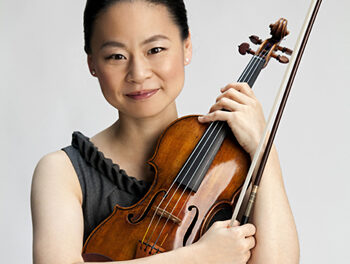Having experienced several flawed all-Beethoven concerts by two famous string quartets in years past, I approached the second subscription concert of the Chamber Arts Society’s current season, given in Page Auditorium on October 13, with trepidation. Past all-Beethoven programs have featured an Op. 18 quartet and shorter ones from the middle and late sets. When one of the long late quartets has been programmed, it has often been in tandem with one of the Op. 59 quartets, which can stand alone in the first half. Instead of such relatively “lite Beethoven,” the Orion String Quartet gave us a heavy winter’s feast of Op. 18/5, Op. 59/2 and Op. 132.
I first heard the Orion String Quartet early in their career when they were, in effect, the quartet-in-residence on the popular Chamber Music Series of Spoleto U.S.A. in Charleston. The two violinists are brothers and alternate playing the first chair. Their bowings are unusually closely matched. Daniel Phillips was an early member of the Chamber Music Society of Lincoln Center. He was invited to the 25th anniversary of the Spoleto Festival last summer since he had been a member of their first season along with other rising stars such as Yo-Yo Ma, Emmanuel Ax and Richard Goode. Brother Todd has been active in the Orpheus Chamber Orchestra and Music from Marlboro among other ensembles. Violist Steven Tenenbom was on this season’s first Chamber Arts Series as a member of the Opus One piano quartet, founded by his wife, pianist Anne-Marie McDermott. Cellist Timothy Eddy, a N.C. School of the Arts alumnus, has been active widely both as a soloist and chamber musician. The Orion Quartet is a mainstay of the Sante Fe Chamber Music Festival.
This has been a difficult review to write, for a simple “sublime” or colloquial “damned fine” seemed too brief. Had I been Beckmesser, I would have found very little to mark, noisily or otherwise. All four players’ phrasing was closely matched. I found all their tempos completely convincing–nothing was rushed for virtuosity’s sake, and the music was given time to breathe. A wide range of dynamics was used with a predominance of the quieter range. The Orion’s study with the famous Vegh String Quartet was reflected in its warm “Middle-European” approach. For some reason, listening to a Tokyo Quartet recording in the afternoon and then closely attending the Orion’s performance of Quartet No. 5 in A, I was struck by the similarity of the Andante cantabile’s third variation to the “Forest Murmurs” of Wagner’s Die Walküre. Todd Phillips held the first chair for the Opp. 18 and 59 quartets and Daniel Phillips led Op. 132. I have never heard the Adagio molto of the E Minor Quartet No. 8 better played; this was a seamless and subtle slow movement. Steven Tenenbom’s viola and Timothy Eddy’s cello were memorable in their solos and duets just before the statement of the Russian theme in the swaggering allegretto.
The Quartet No. 15 in A Minor was magnificent. The highlight was the sublime – and timely – two-part third movement, “Holy Song of Thanksgiving to the Divinity by a Convalescent” (in the Lydian mode), which had a rapt and timeless quality followed by the vigorous contrasting second section, “Feeling of new strength.” This reflected Beethoven’s gratitude for recovery from illness that had interrupted the composition of this masterpiece. I hope retrenchments in the recording industry will not prevent the Orion String Quartet from committing these mature interpretations to CDs.
This wonderful intimate chamber music performance would have sounded extraordinary in either the Chamber Arts Society’s current home in Reynolds Theatre or its original venue, the Ernest Nelson Music Room, but it was instead presented in the vastness of Page Auditorium due to a steeply-raked stage set being used in Reynolds. The marvelous performance that I heard was from the perspective of a front row seat. Subsequent conversations with other attendees indicate that a great deal of the sound was lost in the hall. It would have been challenge enough for one of the supercharged groups such as the Emerson Quartet to fill the hall with sound. Worst of all, the entire balcony was closed to the public. Thirty years’ experience has taught me that the mezzanine and balcony of Page have the best sound. The very worst sound is to be had under the balcony. Early in my former Duke Artists Series subscriber membership, an inexperienced box office person gave me tickets located under the balcony for the Atlanta Symphony. The concert was wretched for me because the sound was as muffled as if I had had a severe head cold. If chamber music patrons must be stuck in Page in the future then at least the paying public should have access to the balcony.











